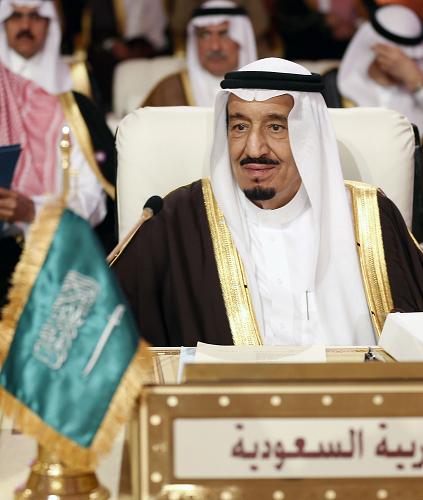Post-Abdullah Saudi Arabia
china.org.cn / chinagate.cn by Sajjad Malik, January 28, 2015 Adjust font size:
|
|
|
A file picture taken on March 26, 2013 shows Saudi Crown Prince Salman bin Abdul Aziz al-Saud attending the opening of the Arab League summit in the Qatari capital Doha. Saudi Crown Prince Salman has replaced Saudi Arabia's King Abdullah bin Abdulaziz, who died January 23, 2015, the royal court said. [Xinhua photo] |
The oil-rich kingdom of Saudi Arabia completed the first phase of its political transition when Crown Prince Salman bin Abdul Aziz succeeded to the royal throne after the death of his brother King Abdulllah bin Abdul Aziz under the country's dynastic rules. Soon after taking power, he announced that he will follow the policies of his predecessor. The assurance gave a sense of relief to the regional and international players that want the kingdom to remain at peace as the winds of the Arab Spring have not yet died down completely.
Saudi Arabia is a key power in the region and almost monopolizes oil exports due to its extensive reserves, which are the largest in the world. It is a close strategic partner of the United States and supports most of its regional policies, ranging from Iran to Syria to Egypt. It is also an absolute monarchy at a time when democratic demands are getting louder, and sometimes the deaths of rulers in such states can open the floodgates of political unrest. There is no such fear in the near future since King Salman is now in the saddle and has already made key appointments without any opposition, including naming a new crown prince and a deputy crown prince. The new crown prince, Muqrin, is King Salman's half-brother, who was appointed third in the line of succession as deputy crown prince under the late King Abdullah. He is the youngest surviving son of Abdul Aziz bin al-Saud, the founder of the present kingdom, who had as many as 45 sons.
King Salman's most important new appointment is that of interior minister Prince Mohammed bin Nayef as deputy crown prince. His elevation might raise eye-brows, as it is the first time that a top slot has been given to the next generation of Saudi rulers, a grandson of Abdul Aziz.
The 79-year old King Salman faces several political and security challenges. He has taken over as Islamic State threatens the kingdom's northern borders while Al-Qaeda in the Arabian Peninsula is getting stronger in Yemen on Saudi Arabia's southern border. Both groups are against the royal family due to its close alliance with the United States. Deputy crown prince Mohammed survived an attack by militants linked to AQAP in 2009, which was the first direct attack on a senior member of the royal family. The kingdom has already joined the U.S. in targeting IS in Iraq, where the rebel group controls vast areas.
Saudi Arabia is also the main supporter of insurgents fighting to topple President Bashar al-Assad of Syria and may face blowback due to the stalemate there. As Assad's forces are becoming stronger and there is no sign of political change, the new king might come under pressure to increase Saudi involvement in Syria.
Furthermore, King Salman will face the challenge of adjusting ties with Iran, which is trying to settle its nuclear issue with the West in a bid to re-enter global economic markets and political affairs to end its isolation. There are greater hopes that an agreement may be reached this year. Such an event would give Iran confidence to counter Saudi influence in the region.
There is also mounting criticism of Saudi Arabia regarding funds allegedly flowing from many of its wealthy citizens to extremist groups. The exact amount of money funneled from the Kingdom is not known. It is also unclear whether the royal family is involved in such funding operations. Regardless, the king will have to address the issue and come clean by launching a crackdown on individuals helping any militant group.
Apart from these challenges, the kingdom also needs to address rising demands for political reform. The late King Abdullah initiated the process and appointed a woman to the council of ministers for the first time in 2009, but the country still bans women drivers and frequently punishes people demanding greater freedom. The case in which a blogger was sentenced to 1,000 lashes brought condemnation from the right groups. One cannot expect the new king to democratize the country, but he will have to decentralize some powers in order to save his successors from major trouble. The Arab Spring might be over, but the energy unleashed by its strong currents will not dissipate easily.
The king will have to consider that the population of youths under 25 is increasing in Saudi Arabia. This age group is an asset as well as a threat. If the wild powers of these youngsters are channeled, they can help build nations. Otherwise, they will cause upheaval.
The writer is Pakistan-based analyst.
